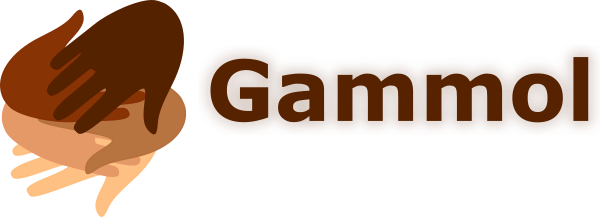Dirk Depoorter
Sunday February 2

Mandinaba
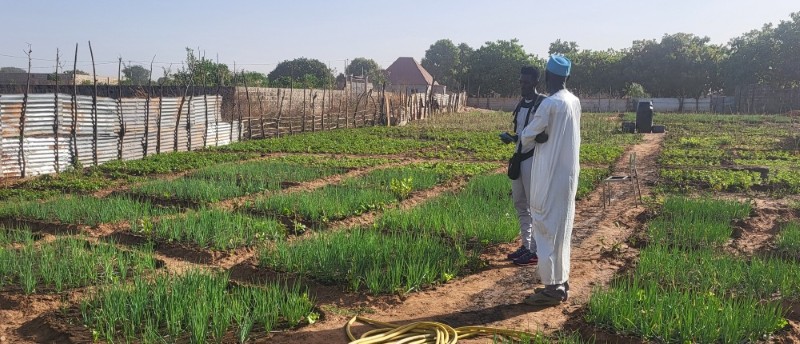
This is the village where we installed a water system in 2022. When we visited them in early 2023, they asked us if we wanted to build a school for them. They have the land for this and given the size of the village, there are certainly enough children to justify this. We told them that this would not be possible in 2023, but that we would definitely come back in 2024. And that in the meantime we expected them to maintain their new system well and take initiatives. However, in early 2024 we had to conclude that they were not maintaining their system well. We are consistent in our message: “we promise, we deliver – you promise, you deliver”. Result: no new school. With the promise to come back in early 2025...
And this time everything was fine: the system was perfectly maintained and they have also created a beautiful garden in the meantime. We do note that the irrigation of the garden is not optimal. Consider providing additional reservoirs here, so that they have a larger capacity. Mandinaba is more than a village, Mandinaba also has a growing population. It does not surprise us that we are asked to expand the installation.
While we are having the previous conversation, one of the participants in the conversation says ‘out of the blue’ that they have also placed taps in the compounds, and not on the public road where everyone can access. Omar is not aware of this, and this is against our basic principle: water must be freely available to everyone. A heated discussion ensues, in which they argue that they did this to protect the taps. An argument that we do not agree with. Someone else also says that they would have said this last year, which is not true. We make it clear to them that we have made the wrong choice to place an installation here, if there is insufficient discipline in the village to maintain and respect the installation. We have not experienced this in any other village, and we really do not want this. Eventually they see that we do not want to deviate from our position and a few people promise us to place the taps back on publicly accessible land. Omar will follow up on whether this actually happens!
After this rather painful discussion, we discuss their request for a new school. We can see that there is a need for it, given the size of the community and the population growth. What they are asking for is an English nursery school, for children between 3 and 6 years old. It goes without saying that, after the previous conversation, we have doubts about whether they will comply with the agreements we make when we build a school somewhere. Building is one thing, but what do they think of our vision and the expectations that flow from it with regard to a Gammol school?
We give them a list of eight questions that we expect to get an answer to. We also send the same questions to Niggie and Faraba Sutu, so that we have an additional element that should help us decide where we are going to set up a school. These are the questions that we expect an answer to:
- Why do you need a school?
- What is the purpose of the school? What do you want to achieve?
- What kind of school: nursery school, primary school, English, Arabic, ...?
- How do you plan to organize yourselves?
- How are you going to find the right teachers?
- How are you going to finance everything (teachers, materials, syllabus, ...)
- What can be the added value of the Mandinaba school for the Gammol School Community?
- What will be your commitment? How can we be sure that what we agree on will also be implemented?
The last question in particular is now a sensitive one for us, after what we have determined in connection with the water installation in 2023, and now with the taps in the compounds. They promise us an answer by February 24.
Sanyang Garden
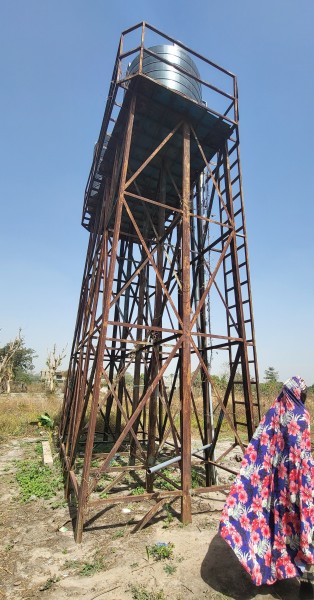
Serious problem in the Sanyang Garden. One of the largest communal gardens in the region, about 10 hectares. There are five water installations that fill the many reservoirs that are set up here and there. These installations were not installed by Gammol, but when there were problems with the pumps and the solar panels, we ensured with Gammol that this was fixed. Now the entire front part is overgrown, because the front installation no longer provides water to fill the reservoirs. Here and there there is still a garden that is maintained, but in the 'old' way: pulling water up a bucket with a rope to water the plants. Not sustainable and not tenable.
The problem is that there is no clarity about who follows up on what and in addition there is a lack of communication. And so everyone just does their own thing, depending on sponsorship money that can come from different sides, or not. For example, part of the fence has recently been repaired, but also not according to the rules of the art. And so we also find that the water installations are not being maintained. Fortunately, the second part of the garden is in good order.
We agree that Gammol will now follow up on all the water installations that are currently in the garden, on condition that everything is maintained. In concrete terms, this means that we will donate all the resources so that they can remove the rust from the towers and the paint to paint everything afterwards. Something that the men from the community will have to do. Only when that has been done, are we prepared to take this ‘into our portfolio’. We are curious. We do not follow up on anything that has nothing to do with water, such as ensuring that there is a decent fence, but we do expect them to do this themselves. It often remains a tug and pull to get them to take the initiative themselves.
Sanyang Fishing Market
We have connected a new tower to the water pump of the Rescue Sea Center on the beach. Our old installation pumped salt water, which is not drinkable. This is still used to irrigate a number of (normal) gardens of adjacent restaurants. The new connection works properly. However, there is only one tap where the women clean the fish, which means that some women have to walk a hundred meters to get fresh water. We spoke about this with Aminata Jatta, who is in charge of the fish market. This is a very limited investment with which we can help a lot of women. It is therefore a simple decision to install three extra taps here and to replace a leaking shut-off tap.
In addition, the problem of the covered market place has not yet been solved: part of the roof is on the verge of collapsing, and has been for a few years now. And we have already made it clear to the VDC that Gammol will not intervene in this, that they can solve this themselves by asking a contribution from the restaurants that use the – now salty – water from our Gammol pump. But any initiative to do so seems to be lacking.
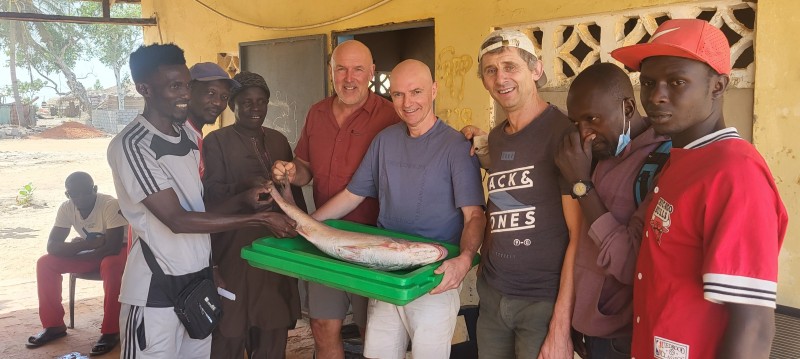
Before we leave, the fishermen give us a fairly large fish as a gift in gratitude for the new tower we have placed. An expensive delicacy here. We cannot refuse, but we gladly give it to Omar and Lamin, so that they can share it with their family.
Monday Februari 3th
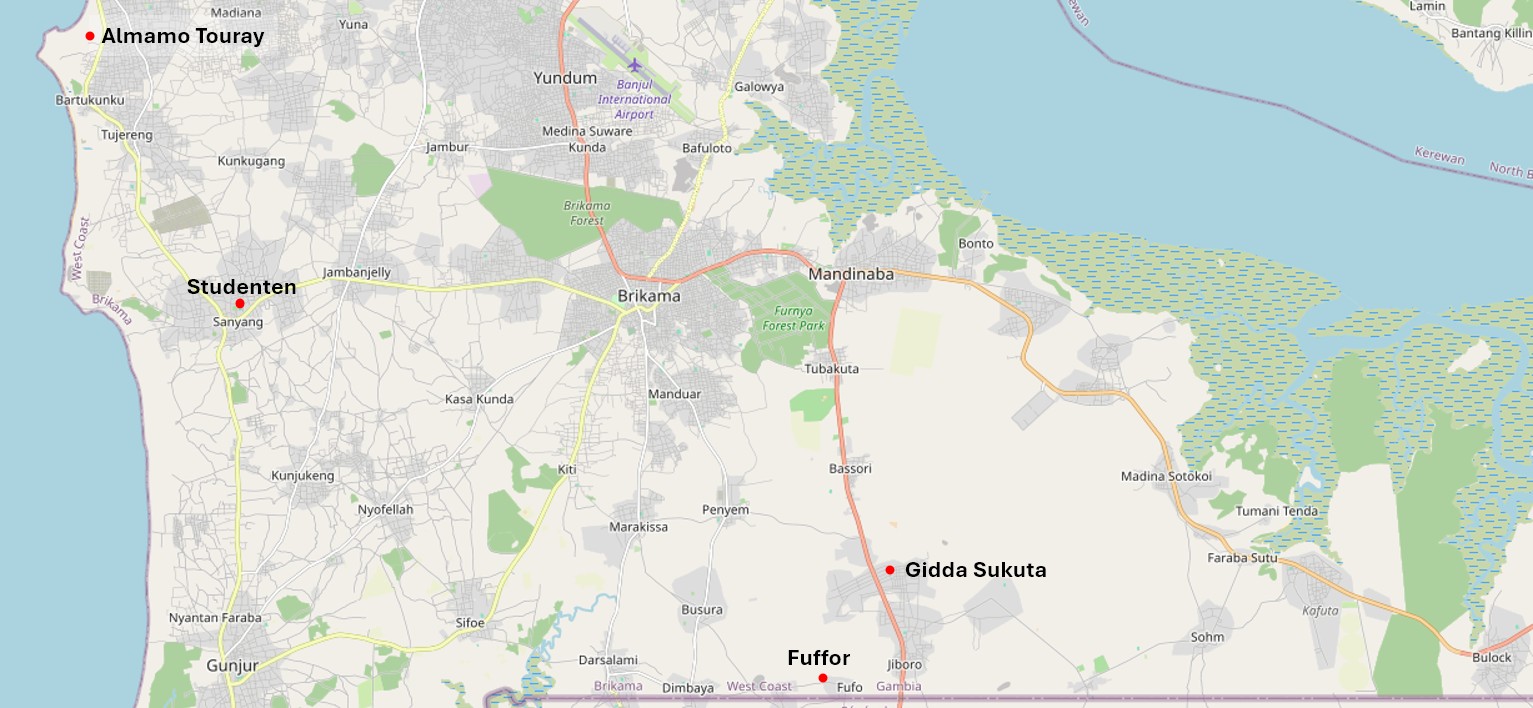
Gidda Sukuta

Today is our first visit to the village where they promised us tomatoes last year. During our visit last year, we had to postpone the extension of the water installation, because the men of the village did not keep their promise to fence a community garden so that the women could grow vegetables. This led to great frustration among the women, to the point that they threw all sorts of unpleasant things at their husbands. At least, that is what we could make of it, since the curses were in Mandinka and Wolf (the local dialects). But sometimes you don't need to know the language to understand them...
The men had apparently gotten the message, because now the garden was completely fenced off, vegetables were being grown (the tomatoes were not yet fully ripe) and we received a very warm welcome from the women with dancing and singing. And of course we had to join in, much to the delight of the women. I do notice that there is a leak in the existing tower. They say that they are going to repair this themselves. Omar has to follow up on this.
After which came the words of thanks, in the 2 dialects and again translated into English. And this by 9 (!) different people. As so often, the messages are the same from the different speakers, sometimes with a different accent, but always a thank you and a request for something extra. In summary:
- BARACABA, or ‘thank you’ in Mandinka. Thank you for taking an interest in Gidda’s needs.
- Gidda loves Gammol and we have to come back every year.
- Last year the whole community was sad and it is partly thanks to the women that we now have vegetables.
- They are impressed by the idea we brought (?) to create a community garden.
- Now that they see the results of their own effort and initiative they say “We will never again promise something we are not going to do”.
- The oldest woman was emotional when she told us how the garden has changed their lives, thanked us for the inspiration we have brought.
Because, now we have the will to take further initiatives: now that they have water and a large community garden, they also want to build a market place near the main road to be able to sell their vegetables. To pay for this, they are going to hold a festival to collect money. They have already dug the foundation for the market place. Contrary to what we expected, they are not asking for financial support for their market place, because we have already given them water. The fact that they want to build their own market place is all because Brikama, the next village, is too far to sell vegetables. With the proceeds they are also thinking about what they can do in the context of educating their children. More of a long-term ambition. They are also thinking about a “health center”. The enthusiasm is very great. Really nice to see. As for the health center, we have to see with Leetulor whether they can provide training here as a first step.
What they do need is extra water. And it is the women who ask us, because they find that sometimes there is not enough water to supply both the garden and the compounds. This is a problem especially after sunset, when the solar panels stop working. As promised last year, we are going to install a second water tank here, so that the capacity doubles. But they are also asking for an extra tower, because of the expansion of the village. The west side extends to 2 km from the tower here. We are not promising anything, but before thinking about installing an additional installation, the need must first be mapped out in order to be able to estimate the real need. They speak of a total of 2,500 compounds, which seems a lot to us.
I give a short speech, in which I do not fail to involve the woman (to the great delight of all the women, but less so of the men) who had made the loudest noise last year and in which I congratulate her on her energy and commitment, which certainly contributed to this result. I would also like to emphasize that we are impressed by the change in mentality that we are now seeing compared to last year. In the meantime, we have already agreed with Dirk and Hedwig that the expansion of the installation will take place, which I of course share with everyone with pleasure, after which even more joy!
To conclude, we are offered a meal in Gambian style. Everyone around a large bowl and eating with our fingers. If you are not used to that, it is not so obvious. A little later they give us a spoon, just a little easier.
Fuffor Village
Fuffor is the village where we built a new school last year, instead of in Mandinaba. And where we will have installed a water installation in 2023. Another village in full expansion. When we drive through it, we indeed notice that they are building a lot, more than we have seen elsewhere. And the reason is simple: the land here is free and there is a water installation with clean water and 15 taps spread across the village, two important additional reasons to move to Fuffor.
The first thing we notice is that a solar panel is broken. We give the message that this needs to be repaired quickly, and that we expect the village to bear the costs. But it is Lamin who accidentally dropped something on the panel. Costs are therefore also for us. When I ask why the repair has not been done, Omar and Lamin answer that the installation provides sufficient energy with three panels. Wrong approach. We make it clear to them that we aim for certain quality standards, that we also expect the villages to maintain the installations perfectly (which is also the case in Fuffor), and that this also means that we set an example ourselves. The broken solar panel must therefore be repaired by us.
In the meantime, the village already has a second community garden in use. It is land belonging to a compound, which has made it available to the community. Fuffor is a good example of a village that takes initiatives. For example, they agreed that everyone had to help put up the fence around the gardens: per compound they had to get 5 poles and put them up, and everyone had to pay 200 dalasi (2.7 euros) so that they could buy the wire. What would also be useful here are water reservoirs that they can fill up extra to irrigate their gardens after sunset. This is also where the idea arose to provide an overflow on our 10,000 liter water reservoirs on the tower to fill reservoirs on the ground if there is a surplus. Now this is drained back to the source, rather than filling reservoirs, so that after sunset they have water for the community garden. The aim should be to provide the pumped water initially as drinking water and for those tasks that require clean water (e.g. cooking), and only when there is a surplus use it to fill the reservoirs for the garden. The overflow must therefore be at the top of the barrel. Also to investigate whether we cannot build our towers even higher, so that we can place extra pipes and taps, over a greater distance. Cost price?

Then it is time to go to the school that Gammol built in 2024. And I have to say, all three of us are impressed. Maybe they made an extra effort because we came, but everything shows that they are very careful with this. The school is built on a piece of wasteland, but all the classrooms are clean. Every Sunday the community ensures that the classrooms are cleaned. What we see in the staffroom is impressive, and we have not seen this in any other school: a wall covered with the lesson schedules, what needs to be done in preparation, the curricula they follow, the tests they take and the results, a code of conduct for both the students and the teachers... this all seems obvious, but in Gambia it is not. And perhaps difficult to understand if you do not see and hear the pride and joy of the teachers yourself, but I get emotional about it. This is partly one of the reasons why we do this, I think to myself. And this is also the message we give them: “you motivate us, to continue what we do”.
A minor point, although we understand the reason why… They sacrificed 2 classes for the children of the nursery school a bit further away, because those classes collapsed. Something we warned them about last year actually happened. Too bad. Actually, there are too few classes now, which is of course not ideal. A solution for this is not immediately at hand.
And then it is time for the words of thanks. But still a little different than we are used to. The welcome is done by the children: a large group of 50 children sing to thank Gammol, after which 4 toddlers recite a poem. Moving. Then come the traditional words of thanks by various speakers. And superlatives are sprinkled. “Gammol has written history and has been given a place in the heart of the community”. The council, the Alkalo, the Imam, the headmaster, one of the parents, two mothers, a VDC member, the chairman of the school committee… everyone thanks Gammol in their own way. But besides the words of thanks, they also give us other messages that give us confidence for the future:
- We promised to fence the garden, it is good that you come and check this.
- Thanks for the ideas that we provide, which have resulted in even more initiative being taken.
- The biggest problem is finding quality teachers, but we also want to involve Gammol in this.
- Provided a contribution (according to their own means, which in reality is limited), all parents contribute to the level of education.
- The importance of water is emphasized several times, for the children, the households, the gardens. And in addition, the importance of education and health care.
- They have also already received training from Mien and Liesbeth, our nurses from Leetulor.
And then the questions arise:
- Paying the teachers is difficult. “The community is kneeling down to ask support to Gammol”.
- Solar panels for the roof of the school to have electricity.
- Fencing the school.
- Water supply in the school. The question here is whether we can indeed install a tap in the school?
- More water for the gardens, which means expanding the installation.
- A second water installation, because of the expansion of the village.
- Materials for the school.
- A ‘health’ centre.
After which an ‘interlude’ follows with five young students dancing and singing for us. Remarkable: it is about 35 degrees and we see a man walking around in a thick winter coat! 😊
Dirk concludes by saying that we are impressed by the welcome we receive from the children, with the singing and dancing. And by the many compliments from the many speakers. We were able to contribute by providing the village with clean water, building a school and Leetulor provided training in wound care. But we also have a bitter feeling: with everything we have already done and then being confronted with ‘more and more’, does not come across well. Gammol has a limited budget, and there are many villages that also need clean water. Dirk asks the question what we should choose: “solar panels on the roof of the school or a water installation in a village that does not have clean water”? It is clear that this message is getting through and without any doubt in his voice the Alkalo says that a water installation in a village that does not have clean water will of course be given priority. He apologizes by asking that we should not be frustrated because of their demand for more. That this is because they see what Gammol's intervention has brought about for the community of Fuffor.
Dirk concludes by repeating our expectations regarding the Gammol School Community, and what this can contribute to their school. With the focus on training, drawing up curricula and following up on the results. How sharing their experience can also help other schools, with emphasis on what we have seen in their teacher's room, which is truly an example for other schools.
We conclude with a very good feeling, on both sides. The women of the village have cooked for us again, a feast, again from one big bowl. Even though we will certainly be late for our next appointment, we can hardly do anything but accept this. We go to the hut where the women are cooking to lose as little time as possible. Nice experience to see how they cook, where each woman has her role. After a dance with the cooks we leave.
Getting to know students
Before we go to our last appointment we quickly pass by our Gammol house to welcome Sterre, Julie and Dina, students from the Thomas Moore University who will be doing an internship here in the coming months.
Mama Afrika Lodge - meeting Almamo Touray
The objective of the meeting with Almamo is to determine what the next steps in the rice project could be. And how we see this in practice.
We are left with many questions after our visit to the rice fields in Janjanbureh. Our objective is “Rice for Gambia”, with the side effect that the population of Janjanbureh will also experience this. We explain to Almamo how cooperation can yield a great advantage, compared to the current method where everyone has their own piece of land. Almamo understands this, the challenge is to convince the ‘plot’ owners of this.
It is already late when the meeting is over. Almamo will work this out further and come up with a proposal. A decision will be made later. The poor result of the first test has taught us a lot. We agree that we have to set up a second test, but under much stricter (also financial) conditions.
